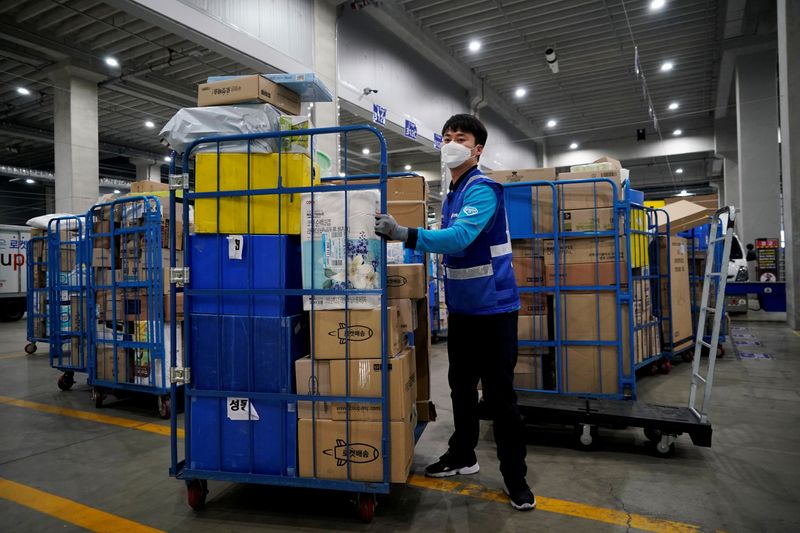
Softbank-backed Coupang under scrutiny after S.Korea warehouse virus outbreak
by ReutersBy Joyce Lee and Hyunjoo Jin
SEOUL (Reuters) - Deluged with online orders as the coronavirus epidemic swept South Korea, e-commerce giant Coupang opened a new groceries warehouse and logistics centre near Seoul in March, providing food and other essentials to shoppers sheltering at home.
But health authorities and former workers say the company may have failed to follow measures to prevent infections at the facility, which is now at the centre of South Korea's latest outbreak of the disease.
More than 100 cases linked to the Coupang facility have been recorded in less than a week, raising the spectre of a second wave of COVID-19 in a country praised for containing the first outbreak.
Coupang, backed by Japan's SoftBank and dubbed the Amazon (NASDAQ:AMZN) of South Korea, hired thousands of temporary workers to staff the 24-hour operation.
Health authorities said it appears some workers did not wear masks and social distancing rules were not observed in smoking rooms and cafeterias. Traces of the virus were also detected on protective helmets and computer equipment at the centre, they said.
One video shared on YouTube by a woman who said she worked at another Coupang logistics centre showed masked workers standing closely together in line at a cafeteria.
"It's true that managers couldn't manage the large number of people during the meals and breaks," a man who worked at the Coupang Bucheon logistics centre from March to May told Reuters.
Another woman who worked at a Coupang logistics centre said many workers applied by text message and were hired without interviews because the need for staff was so great.
"There were so many people at the centre that I thought it would be disastrous if the virus spread," said the woman surnamed Choi, who shared her experience on social media. Choi did not respond to an interview request.
Workers were paid about 100,000 won ($80) for a 10 hour shift scanning barcodes and packaging products for delivery, she added. South Korea's mininum wage is 8,590 won per hour.
Coupang said it has implemented measures recommended by health officials at cafeterias, smoking rooms and communal areas at the centre on May 25, but declined to comment on whether the guidelines were observed before the first case was confirmed on May 23, saying it is cooperating with an investigation that is underway.
Coupang said it does not conduct interviews when hiring short-term workers, but declined to comment on its hiring numbers.
"Coupang has been making utmost efforts to protect the safety of customers and employees," it said.
During a Reuters visit to one of its distribution centres in March, Coupang said it disinfects trucks and the warehouses, and workers wear masks and undergo temperature checks.
TEMPORARY WORKER RISKS
Health authorities have tested more than 3,700 workers at the warehouse, and about 97% of them were daily workers, contract workers and outsourcing employees, a Bucheon city spokesman said.
Lee Jae-myung, the governor of Gyeonggi Province, home to the centre, said many workers at the facility had two or three jobs, exposing them to a greater risk of infection. He ordered a two-week suspension of the facility.
The first confirmed case was a temp worker who is suspected to be connected with a Seoul nightclub outbreak earlier this month.
Vice Health Minister Kim Gang-lip has urged companies to step up quarantine efforts especially in confined, labour intensive workplaces.
Outbreaks have occurred in similar facilities elsewhere.
In the United States, Amazon warehouse employees staged a walkout demanding safer working conditions after at least 800 workers in its distribution facilities tested positive for COVID-19.
Coupang, a $9 billion startup founded by Harvard graduate Bom Kim, narrowed its losses last year and is one of the few bright spots for SoftBank and its Vision fund, which together invested $3 billion in the firm.
It leveraged its extensive logistics network and delivery operations to ship anything from toilet paper to fresh kimchi pickles as quickly as a few hours.
South Korea, already the world's fifth biggest e-commerce market according to researcher Euromonitor, saw online retail sales jump 12% to 12.6 trillion won ($10.18 billion) in March alone from a year ago.